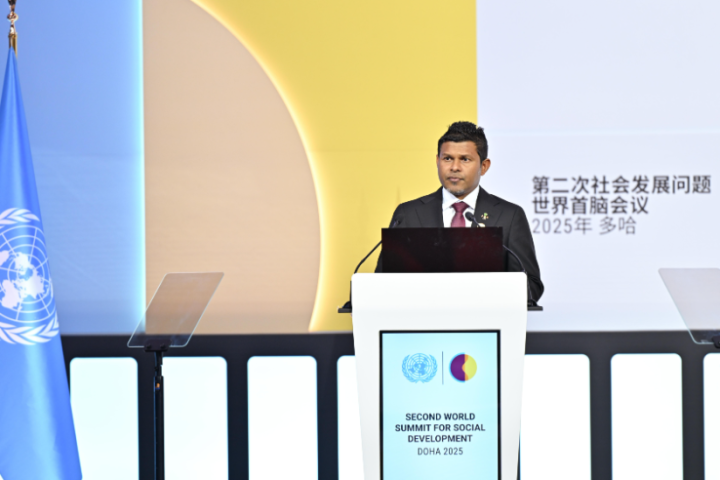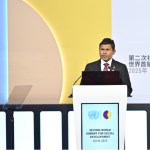BRUSSELS — In a packed conference hall at the International Democracy Union (IDU) Forum 2025 Summit, Abdulla Shahid, president of the Maldivian Democratic Party (MDP) and former foreign minister, delivered a searing speech that reverberated far beyond the small island nation he represents. Addressing global party leaders, Shahid highlighted concerns about the Maldives’ democracy, cautioning that its hard-won democratic gains are at risk from increasing executive overreach. His speech, both a lament and a call to action, sought to rally international support to reverse what he described as a deliberate dismantling of democratic institutions under President Dr. Mohamed Muizzu’s administration.
Shahid’s address comes at a critical juncture for the Maldives. Once hailed as a democratic success story after its transition from autocracy in 2008, the country now faces a backslide that Shahid argues threatens not only its future but also the global fight for democratic values. His speech, delivered with the gravitas of a seasoned diplomat, aimed to galvanize the IDU’s center-right coalition to stand with the Maldivian people in their fight to preserve democracy.
Shahid’s speech centered on three interlocking themes: the betrayal of democratic ideals, the systematic undermining of independent institutions, and a defiant call for resilience and international solidarity.
Shahid accused President Muizzu of ascending to power in 2023 through a campaign built on falsehoods, particularly claims that the MDP government had compromised national sovereignty by allowing foreign military presence. “President Muizzu came to power on the wings of lies,” Shahid declared, noting that President Muizzu later admitted there was no such threat. These fabrications, Shahid argued, were designed to “divide our people and stoke xenophobia,” eroding public trust and straining ties with key allies like India. This narrative of betrayal underscored Shahid’s broader point: that President Muizzu’s administration has prioritized power over truth, setting the stage for democratic erosion.
The heart of Shahid’s speech was a detailed account of how democratic institutions have been hollowed out. He highlighted a controversial constitutional amendment passed in November 2024, which allows party leaders to unseat elected members of Parliament, effectively nullifying voter mandates. “A citizen votes. A candidate wins. But a party leader, behind closed doors, can now erase that mandate,” he said, framing the move as a direct assault on democratic representation.
Shahid also pointed to the judiciary’s collapse, noting that three Supreme Court justices were suspended or resigned amid murky corruption allegations, with the Judicial Services Commission—stacked with government loyalists—recommending their dismissal. “The highest court in the country is now crippled,” he said. Independent bodies like the Anti-Corruption Commission and Elections Commission, he added, have become “presidential puppets,” with legislative changes granting President Muizzu direct appointment powers. These examples painted a picture of a government systematically rigging the system to consolidate control.
Etruth has reached out to the government spokesperson for comment on the matter, and we are still awaiting a response.
Despite the grim portrait, Shahid struck a note of defiance, emphasizing the MDP’s commitment to fight back. “We are not here to mourn democracy’s decline. We fight to reverse it,” he said, invoking the Maldivian people’s history of resilience. He appealed directly to the IDU’s global audience, urging them to “stand with the Maldivian people” by supporting judicial independence, journalists facing intimidation, and youth protesting peacefully. “The tide of authoritarianism is high. But so is our will,” he concluded, framing the struggle as a universal battle for democratic values.
In response to such concerns, Foreign Minister Dr. Abdulla Khaleel posted, “The Government of President Dr @MMuizzu will not interfere with the Judiciary. Nor will it undermine due process. This is the case with the recent dismissal of the two Supreme Court Justices by the Parliament, following the investigation by the Judicial Services Commission. The Government remains fully committed to maintaining the independence of the Judiciary and the rule of law. One would hope and wish that those in responsible positions in the Opposition, engaging with the international community, speak on facts and the truth.”
To understand the weight of Shahid’s speech, one must grasp the Maldives’ turbulent political journey. For three decades, the country was ruled by Maumoon Abdul Gayoom, a grip stifled dissent. The 2008 elections, which brought the MDP to power under Mohamed Nasheed, marked a historic shift toward democracy. Yet, the transition was rocky. A 2012 coup ousted Nasheed, and subsequent years saw political instability, with authoritarian tendencies resurfacing under President Abdulla Yameen (2013–2018).
The MDP’s landslide victory in 2018, led by President Ibrahim Mohamed Solih, promised a democratic renaissance. Shahid, as foreign minister, played a key role in restoring the Maldives’ international standing, rejoining the Commonwealth, and championing human rights and climate action. The pace of judicial reforms fell short of the electorate’s expectations, as outlined in the government’s mandate. The MDP undermined the judiciary’s independence by enhancing the role of the Judicial Service Commission (JSC), appointing a Member of Parliament to lead the JSC, and sidelining the Supreme Court in key decisions and meddling in judicial affairs. But the 2023 election of Muizzu, a former mayor aligned with the Progressive Party of Maldives (PPM), shifted the tide. President Muizzu’s campaign capitalized on anti-India sentiment, falsely accusing the MDP of compromising sovereignty—a charge Shahid debunked in his speech.
The constitutional amendment, which Shahid criticized, is seen as a particularly egregious step, allowing party elites to override voter choice. This aligns with the Maldives’ adoption of a global trend toward “hybrid regimes”—systems that maintain democratic facades while concentrating power in the executive.
Shahid’s speech also reflects the Maldives’ outsized role in global democratic discourse. Despite its small size, the nation has been a vocal advocate for small island states, particularly on climate and human rights. Shahid’s tenure as president of the 76th U.N. General Assembly (2021–2022) elevated his profile, making his warnings about democratic backsliding resonate with an international audience attuned to similar struggles in places like Hungary, Turkey, and Myanmar. However, recent developments in the Maldives have sparked debates about the state of its judiciary and democratic institutions, with some arguing that the international community’s selective and uneven criticism undermines its credibility, having been perceived in the past as interference in domestic affairs.
Shahid’s speech is both a domestic rallying cry and a strategic appeal to the international community, with implications that ripple across multiple spheres.
For Maldivians, Shahid’s speech is a call to safeguard democratic principles against growing executive overreach. His emphasis on the MDP’s resolve—“We built it once. And we will do it again”—aims to energize party supporters and civil society, particularly youth activists like those in the “Dhuleh Nukuraanan” (“We will not give up”) movement. However, these young activists, accused MDP attempts to influence their efforts, have paused their demonstrations for now. By highlighting concerns over police conduct and judicial integrity, Shahid seeks to galvanize public support ahead of future elections, though the MDP faces an uphill battle against a government wielding significant institutional control.
The IDU, founded in 1983 by luminaries like Margaret Thatcher and George H.W. Bush, is a powerful platform for center-right parties to coordinate on democracy promotion. Shahid’s appeal to its members—representing countries like the United States, Germany, and Australia—aims to secure diplomatic pressure on President Muizzu’s government. Posts on X from Shahid and the MDP indicate he has already met with Commonwealth leaders to raise similar concerns, suggesting a broader diplomatic offensive.
However, the speech risks straining ties with President Muizzu’s administration. Shahid’s accusations of lies and authoritarianism could deepen domestic polarization, especially among President Muizzu’s base, who view the MDP as elitist. The government may also dismiss Shahid’s claims as partisan, pointing to the MDP’s own governance flaws, such as internal factionalism during its 2018–2023 tenure.
Shahid’s speech underscores a broader crisis: the global erosion of democratic norms. The Maldives’ struggle mirrors challenges in other small states, where limited resources and institutional fragility make democracy vulnerable to strongman tactics. His appeal for solidarity could inspire similar movements elsewhere, but it also tests the IDU’s commitment to democracy promotion in non-Western contexts. If the international community fails to act, it risks emboldening authoritarian leaders worldwide.
The speech’s focus on media dynamics and youth protests highlights universal issues. While Shahid raised concerns about media suppression, the Maldives was recognized on World Press Freedom Day as a beacon of hope in South Asia, rising in the press freedom index as other regional countries slid in their rankings, according to Reporters Without Borders.
Abdulla Shahid’s speech at the IDU Forum 2025 Summit underscores that democracy, even in a nation as small as the Maldives, is a global concern. Democracy is a contest among those wielding power, those seeking to consolidate control, and those striving to gain influence—a struggle mirrored worldwide in the rising tide of authoritarianism and nationalism, from which the Maldives is not exempt.
Shahid’s warnings about executive overreach and institutional challenges highlight the fragility of the nation’s young democracy. It falls to the electorate to safeguard their hard-earned freedoms, and to the responsible opposition, particularly the MDP, to educate the public on these challenges beyond mere rhetoric.
Can Shahid and his team rise to this task, uniting their efforts without internal discord? His call for solidarity, grounded in the Maldives’ history of resilience, offers hope but also a warning: without collective action, the democratic light may dim.












